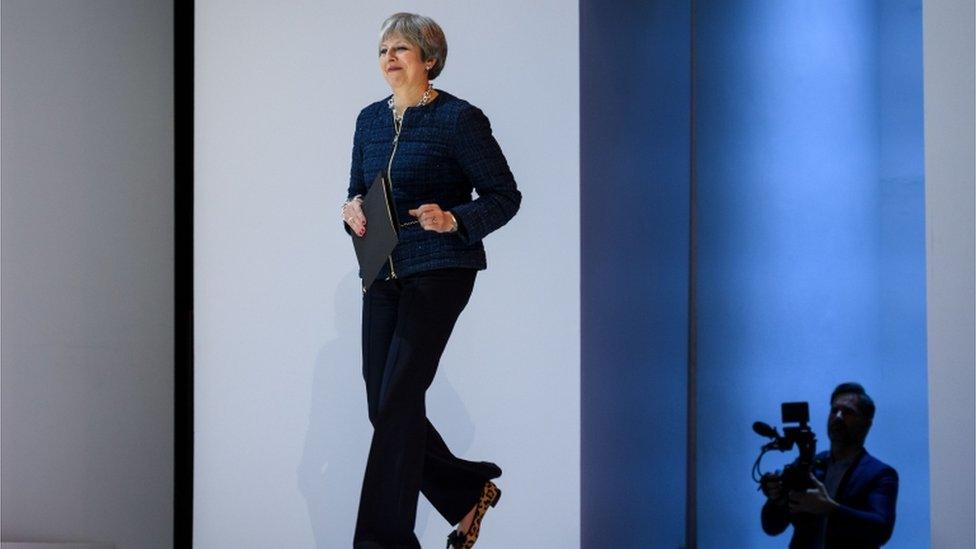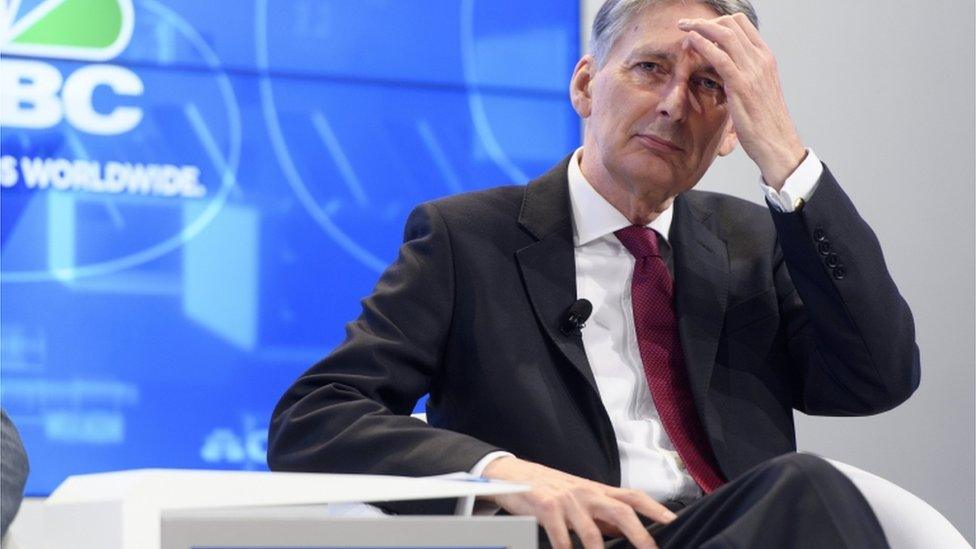Tories' Brexit agonies resurface
- Published

If the Tory party had wanted intentionally to display just how divided they are over Brexit and how generally twitchy they are, they could hardly have done a better job.
Not in off-the-cuff remarks but in scripted comments, one of the most convinced Brexit "softies" in the Cabinet, the chancellor himself, told delegates in Davos that he believed, hopefully, that the changes between the EU and UK economies would be "very modest", as we leave the European bloc.
Meanwhile, the emboldened voice of backbench Brexiteers, Jacob Rees-Mogg, had prepared a speech of his own, accusing ministers of being cowed by the EU and calling for the government to stiffen its sinews in the Brexit talks or risk letting down voters and opting only for a "managed decline".
Before you switch off from this neat, yet predictable demonstration of the division inside the governing party, remember it matters because it will shape the decisions that are made about the country's relationship with the EU in years to come, which will have an impact on all of our lives.
And it constrains Theresa May's ability to keep the show on the road. She has, since moving into Number 10, had to balance the two wings of her party, and particularly pay attention to the Brexiteers.
The sheer force of numbers of them on the backbenches and her lack of majority mean they are essentially her domestic base. It's not always been easy, but until now, they have been quite peaceable in public, relatively speaking.
The conventional logic has been that while they are on board Theresa May is safe, and while not ardent fans, they have been content to support her in office, knowing they are able to wield significant private influence to deliver what they see as "their" Brexit.

Philip Hammond's comments at Davos attracted some criticism
In the last ten days or so, with talk of transition, but more to the point the political mishandling of the reshuffle and the perceived tin ear of Number 10 on other issues, some ardent Brexiteers are looking at the Tories' prospects and wondering if it's time to change their calculation.
One senior Tory told me: "Brexit has been so mishandled, whether we are right or wrong, we know it's bleeding into the party's prospects. In whose interests is it that she continues leading the party? A handful of cabinet ministers who can't summon up the wit to do anything."
Essentially, Brexiteers were content to back the prime minister as long as it looked like she was more or less on track to lead the party and the government through a departure of the EU that was broadly to their liking, with a clean break from the single market and the customs union, a focus on free trade and cutting immigration.
And arguably after the election, their hand was strengthened given they were the biggest group on the Tory backbenches and Theresa May also had to rely on the DUP, who are also Brexiteers, to survive.
'Regime change'
But a perceived softening in her position, over the transition period, as we discussed earlier and a series of political missteps has, for some MPs at least, changed that calculation.
For some, "we are now in a regime change state of mind", with the possibility of seeking opportunities to remove the prime minister on the agenda.
And their putative leader, Jacob Rees-Mogg, head of the influential ERG grouping of Brexiteers hinted that there could be trouble in the Commons on our Brexit podcast, saying they hoped to change the government's Customs Bill, by coincidence of course, a bill politically owned by one Philip Hammond.
David Davis v Jacob Rees-Mogg on Brexit transition
That would be the first time that Brexiteers have made trouble publicly for the government's programme of legislation and raises the prospect of rebels to the right of the prime minister, and rebels to the [Tory] left of her, with no way out.
One Tory source told me: "I've never known this level of frustration amongst colleagues. It feels like nothing is happening. No one thinks it can carry on like this and something has to give - that's probably Theresa. The question is when? The answer is, hopefully soon."
But - this is important - take a deep breath.
None of this means that it is inevitable that Theresa May is on her way out.
None of this means there will even be a challenge.
And none of this means a spring breeze couldn't sweep away the sour mood in a couple of weeks' time.
Losing patience
Number 10 is convinced that the fundamentals haven't changed. It's likely the majority of MPs, and almost certainly the majority of ministers, think she should stay on.
A leadership contest in the middle of Brexit? The EU would be appalled. And how many members of the public would look kindly on yet another political drama? We can all guess the answer to that.
Moreover, it is absolutely the case that the Tories agree on neither a clear way forward on Brexit, nor a best potential successor, nor even a vision of the kind of party they really want to be and policies they want to pursue in the future.
No-one in the party can agree on a better answer to the status quo. And remember, it is always easy in politics to say, "we can't go on like this".
Yet even MPs who back the prime minister are losing patience. One told me today: "We try to help her but she just won't let us, it's all draining away."
As the Tories' agonies over Brexit resurface, the prime minister has neither the luxury of time nor it seems, unconditional support from her own side.